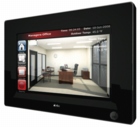Ability enables retailers in centres to control their own air conditioning

Ability Projects has launched a mini BMS package to enable individually owned and franchised operations in large multi-retail complexes to control their fan-coil air conditioning independently of the main shopping-centre system. The first such standalone package has been supplied by Ability for a retail clothing outlet in a Stratford multi-store complex where chilled water is supplied from central plant to 15 Matrix II 4-pipe fan–coil units in the shop and back-of-house areas.
The use of Matrix II fan-coil units eliminated the need for conventional balancing of water circuits and airflow. Other projects in the pipeline include airside outlets at Heathrow and Gatwick Airports.
The self-contained package comprises a colour 18 cm touchscreen display as the user interface and head end. Subscreens show the fan coils, settings and real-time operating conditions. These features can be complemented by occupancy monitoring and time scheduling.
All features are simple to operate by the outlet manager according to suit opening hours, stock taking and variable occupancy such as in stock rooms or staff rooms.
Systems are BACnet native and connections are made by Cat5 Ethernet cables and a readily purchased Ethernet switch. The fan-coil units incorporate their own terminal control device.







